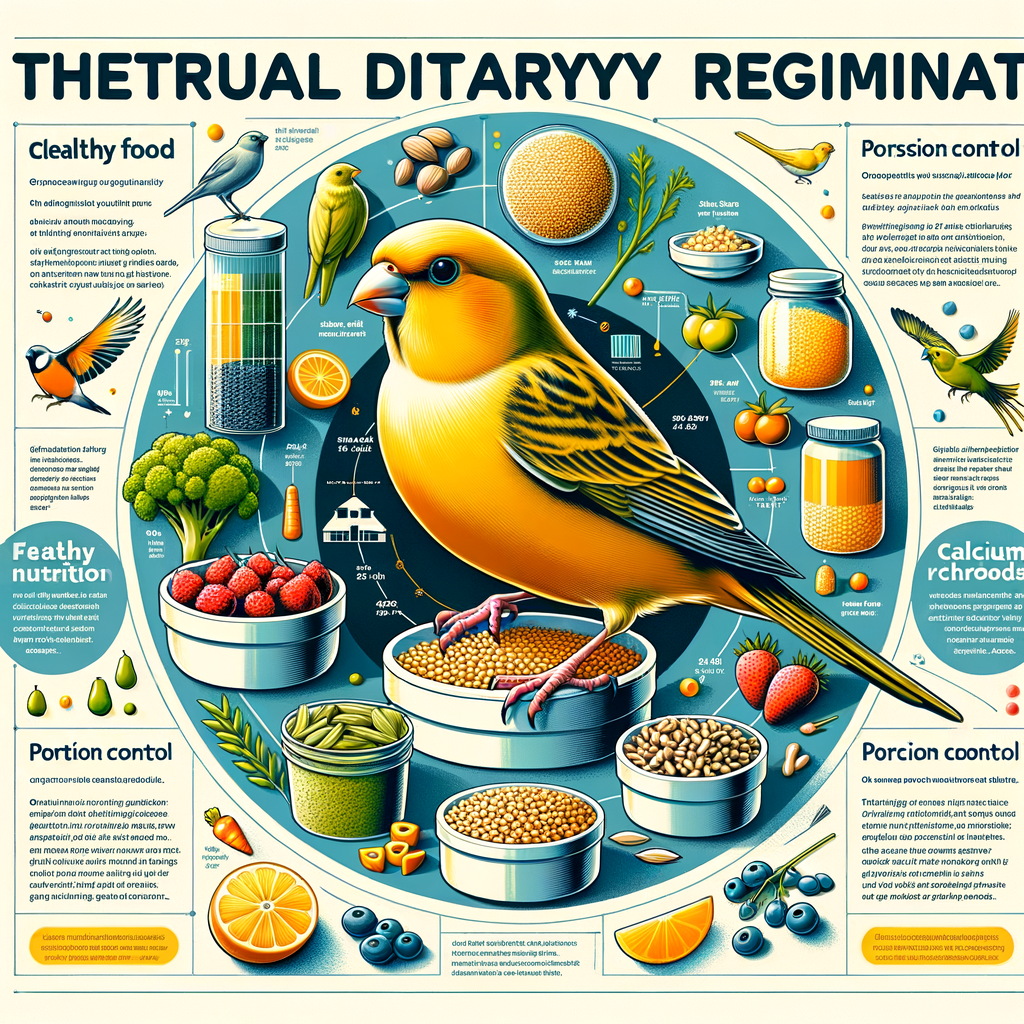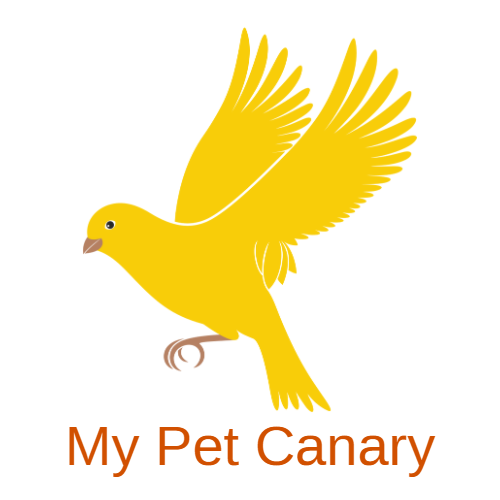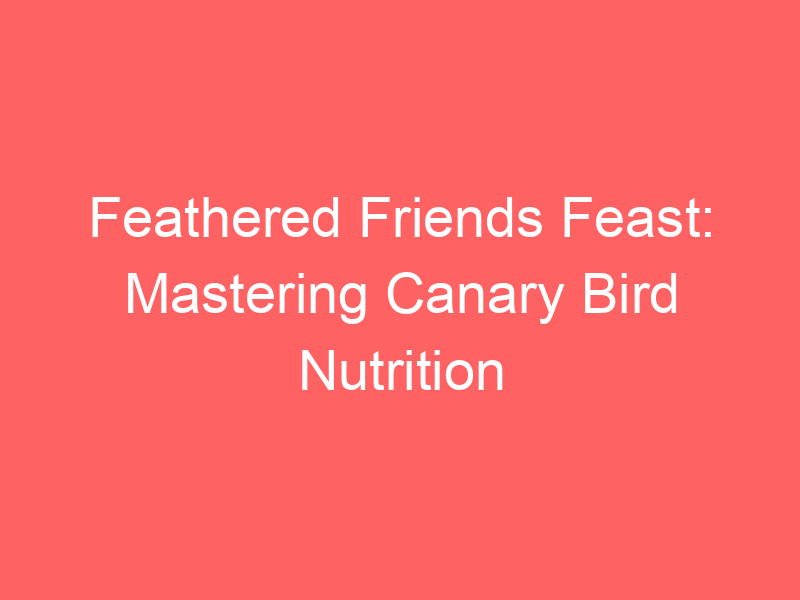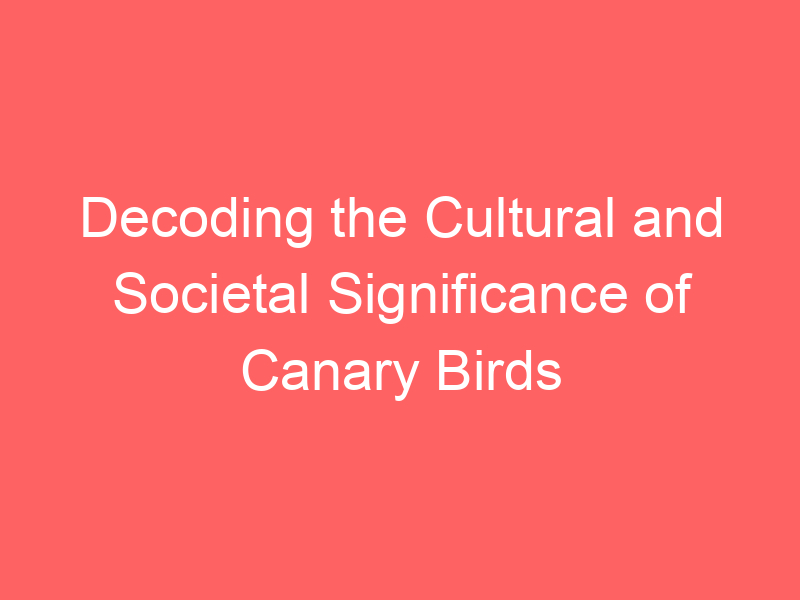
Introduction to Canary Bird Nutrition
Canary birds, known for their vibrant colors and melodious songs, require a balanced diet to maintain their health and vitality. This introductory section will help you understand the importance of a balanced diet for canaries and dispel some common misconceptions about their diet.
- Understanding the Importance of a Balanced Diet for Canary Birds
- Common Misconceptions about Canary Bird Diet
Just like humans, canary birds need a balanced diet to thrive. A balanced diet for canaries includes seeds, fruits, vegetables, and proteins. Seeds should make up about 50% of their diet, while fruits and vegetables should comprise 45%. The remaining 5% should be proteins like boiled eggs or tofu. This balanced diet ensures that your canary bird gets all the necessary nutrients it needs to stay healthy and sing beautifully.
One common misconception about canary bird diet is that seeds alone are enough. While seeds are an essential part of their diet, they do not provide all the necessary nutrients. Another misconception is that canaries do not need water. Canaries, like all birds, need fresh water daily for drinking and bathing. Finally, some people believe that canaries should not be fed fruits and vegetables. This is incorrect as fruits and vegetables provide essential vitamins and minerals that are not found in seeds.
In conclusion, understanding and providing a balanced diet for your canary bird is crucial for its health and well-being. By debunking common misconceptions about canary bird diet, you can ensure that your feathered friend lives a long, healthy, and happy life.
Comprehensive Guide to Bird Nutrition
Understanding bird nutrition is crucial for maintaining the health of your canary. This guide will delve into the essential nutrients required by canary birds and their significance.
Essential Nutrients for Canary Birds
Canary birds, like all living creatures, require a balanced diet to thrive. This diet must include proteins, vitamins, and minerals. Let’s explore these nutrients and their importance in detail.
- Proteins and their importance
- Vitamins and their role in canary bird health
- Minerals and their significance
Proteins are vital for the growth and repair of body tissues in canary birds. They are the building blocks of feathers, beaks, and claws. A diet rich in proteins can help your canary bird maintain a vibrant plumage and a strong body. Examples of protein-rich foods for canary birds include seeds, legumes, and insects.
Vitamins are essential for various bodily functions. For instance, Vitamin A is crucial for maintaining good vision and a healthy immune system. Vitamin E is an antioxidant that protects the bird’s body from damage. Vitamin D3 helps in calcium absorption, which is necessary for strong bones and eggshell formation. Fruits and vegetables are excellent sources of vitamins for canary birds.
Minerals are vital for the overall health and wellbeing of canary birds. Calcium, for example, is necessary for bone health and egg formation. Iron is needed for the production of red blood cells. Zinc plays a role in feather growth and wound healing. Minerals can be found in a variety of foods, including seeds, fruits, vegetables, and cuttlebone.
In conclusion, a balanced diet rich in proteins, vitamins, and minerals is essential for the health and wellbeing of your canary bird. By understanding these nutrients and their roles, you can provide your bird with the best possible care.
Canary Bird Food Choices
When it comes to feeding your canary bird, it’s important to understand the variety of food choices available. Here, we will discuss three primary components of a canary bird’s diet: seeds, fruits and vegetables, and fresh water.
- Seeds as a primary food source
- Supplementing with fruits and vegetables
- Importance of fresh water
Seeds are a staple in the diet of canary birds. They provide essential nutrients that these birds need for their overall health and well-being. A mix of canary seeds, millet, and niger seeds is often recommended. However, seeds should not be the only food source for your bird. While they are packed with nutrients, they lack certain vitamins and minerals that canaries also need.
Fruits and vegetables should be included in your canary’s diet to provide a balanced nutrition. They are a great source of vitamins and minerals that are not found in seeds. Apples, oranges, bananas, and leafy greens like spinach are excellent choices. Remember to wash all fruits and vegetables thoroughly before feeding them to your bird to remove any pesticides.
Water is an essential part of a canary’s diet. Fresh and clean water should be available to your bird at all times. It helps in digestion and keeps your bird hydrated. Water containers should be cleaned daily to prevent the growth of bacteria and other harmful organisms.
In conclusion, a healthy diet for a canary bird should include a mix of seeds, supplemented with a variety of fruits and vegetables, and plenty of fresh water. This will ensure that your bird gets all the necessary nutrients it needs to live a healthy and happy life.
Dietary Decisions for Canaries
Choosing the right diet for your canary is crucial to its health and longevity. In this section, we will guide you through the process of making the best dietary decisions for your feathered friend.
Choosing the Right Food
When it comes to feeding your canary, you have two primary options: commercial bird food and a homemade diet. Both have their pros and cons, and understanding these can help you make an informed decision.
- Commercial bird food vs homemade diet
- Understanding food labels
Commercial bird food is readily available and specially formulated to meet the nutritional needs of canaries. It often contains a mix of seeds, grains, and fortified pellets to provide a balanced diet. However, some brands may include artificial colors, preservatives, and fillers that are not beneficial to your bird’s health.
On the other hand, a homemade diet allows you to control the quality and variety of food your canary consumes. Fresh fruits, vegetables, and cooked grains can provide essential nutrients. However, creating a balanced homemade diet requires careful planning and knowledge of a canary’s nutritional needs.
Whether you choose commercial bird food or prepare a homemade diet, understanding food labels is essential. Look for products that list whole foods, such as seeds and grains, as the first ingredients. Avoid foods with artificial colors, preservatives, and fillers. If you’re preparing a homemade diet, ensure you’re including a variety of foods to meet your canary’s nutritional needs.
In conclusion, the best diet for your canary depends on your ability to provide a balanced diet, whether through commercial bird food or a homemade diet. Understanding food labels can help you make the best choices for your bird’s health.
Feeding Schedule and Portions
Understanding the feeding schedule and portion sizes for your canary bird is crucial for its health and well-being. Let’s delve into these two important aspects.
-
How often to feed your canary bird
Canary birds, like most birds, eat throughout the day. It is recommended to feed your canary bird twice a day, once in the morning and once in the evening. This ensures that they have a steady supply of food to keep their energy levels up. However, remember that every bird is unique. Monitor your bird’s eating habits and adjust the feeding schedule as needed.
-
Understanding portion sizes
When it comes to portion sizes, it’s important to remember that canary birds are small creatures with small stomachs. A good rule of thumb is to provide a portion of food that’s roughly the size of your bird’s eye. This may seem small, but remember, you’ll be feeding them twice a day. Also, canary birds need a balanced diet, so make sure to include a mix of seeds, fruits, and vegetables in their meals.
Feeding your canary bird properly is a key part of ensuring their health and happiness. By understanding how often to feed your bird and the right portion sizes, you can provide them with the nutrition they need to thrive.
| Feeding Aspect | Guideline |
|---|---|
| Feeding Frequency | Twice a day (Morning and Evening) |
| Portion Size | Size of the bird’s eye |
Remember, these are general guidelines and may need to be adjusted based on your bird’s specific needs. Always observe your bird’s behavior and consult with a vet if you have any concerns.
Nutrition Guide for Canary Birds
Understanding the nutritional needs of your canary bird is crucial for its health and longevity. This guide will delve into the special dietary needs of canaries at different life stages, namely young and elderly canaries.
Special Dietary Needs
Canaries, like humans, have different dietary needs at different stages of their lives. Let’s explore these needs in detail.
- Dietary needs for young canaries
- Dietary needs for elderly canaries
Young canaries, also known as fledglings, require a diet rich in protein to support their rapid growth and feather development. A balanced diet for fledglings should include a mix of canary seed, fresh fruits and vegetables, and a high-quality pellet diet. It’s also important to provide them with a calcium source, like cuttlebone or mineral block, to support bone development.
Elderly canaries, on the other hand, may need a diet lower in protein and higher in fiber to aid digestion. They also require more vitamins and minerals to support their immune system. In addition to their regular seed diet, elderly canaries should be offered a variety of fresh fruits and vegetables, along with a calcium source. It’s also beneficial to include a specialized senior bird diet that’s designed to meet their unique nutritional needs.
Remember, every bird is unique and may have individual dietary needs. Always consult with a vet or a bird nutrition expert to ensure your canary is getting the right nutrition.
In the next section, we will discuss common dietary issues and solutions for canary birds. Stay tuned!
Common Dietary Issues and Solutions
Just like humans, canary birds can also face dietary issues. These problems can affect their health and lifespan. Let’s explore two common dietary issues in canaries and how to address them.
- Obesity in Canary Birds
- Proper Diet: Feed your canary a balanced diet of seeds, fruits, and vegetables. Avoid giving them too many fatty seeds like sunflower seeds.
- Exercise: Encourage your canary to fly around their cage or room to burn off excess calories.
- Malnutrition and its Signs
- Varied Diet: Provide a variety of foods to ensure your canary gets all the necessary nutrients. This can include seeds, fruits, vegetables, and bird-safe proteins.
- Supplements: If your canary’s diet is lacking in certain nutrients, consider adding a bird-safe supplement to their food.
Obesity is a common issue in canary birds, often due to overfeeding or lack of physical activity. An obese canary may have difficulty flying and may suffer from various health problems such as heart disease and liver problems.
Here are some solutions to help your canary maintain a healthy weight:
Malnutrition in canary birds can occur if they are not getting enough nutrients from their diet. Signs of malnutrition include dull feathers, lethargy, and weight loss.
Here’s how you can prevent malnutrition in your canary:
Remember, a healthy diet is key to a healthy canary. By being aware of these common dietary issues and their solutions, you can ensure your feathered friend lives a long and happy life.
Best Diet for Canary Birds
Choosing the right diet for your canary bird is crucial for its health and longevity. The best diet is a balanced one, which includes a variety of foods. Let’s delve into the top food choices for your feathered friend.
Top Food Choices
When it comes to feeding your canary bird, there are two main options: commercial bird foods and homemade diets. Both have their advantages and can provide your bird with the nutrients it needs.
- Review of top commercial bird foods
- Best homemade diet recipes
Commercial bird foods are readily available and specially formulated to meet the nutritional needs of canary birds. They often contain a mix of seeds, grains, and fortified pellets. Some top brands include Kaytee Forti-Diet Pro Health, Volkman Avian Science Super Canary, and Zupreem FruitBlend.
These commercial diets are convenient and easy to use. However, they should not be the only source of nutrition for your bird. Fresh fruits, vegetables, and other foods should also be included in their diet.
Homemade diets give you control over what your bird eats. They can be tailored to your bird’s specific needs and preferences. A good homemade diet for canaries might include a mix of fresh fruits and vegetables, cooked eggs, and a small amount of seeds and grains.
For example, you could make a simple salad for your bird with finely chopped apples, carrots, and spinach. Add a boiled egg for protein, and a sprinkle of millet or canary seed. Remember, variety is key to providing a balanced diet.
Whether you choose commercial or homemade diets, the most important thing is to ensure your bird gets a variety of foods. This will provide them with the nutrients they need and keep them happy and healthy.
Canary Bird Nutrition Tips
When it comes to feeding your canary bird, it’s important to understand the basics of their nutrition. Here are some tips to help you transition your bird to a new diet and introduce new foods.
- Tips for transitioning to a new diet
- Gradual Change: Don’t make the switch all at once. Start by mixing a small amount of the new food with the old one. Gradually increase the new food’s proportion over a week or two.
- Monitor Your Bird: Keep a close eye on your bird during the transition. If your bird is not eating enough, or shows signs of stress or illness, consult a vet immediately.
- Patience is Key: Remember, it might take some time for your bird to accept the new food. Be patient and persistent.
- How to introduce new foods
- Start Small: Begin with small portions of the new food. This will allow your bird to get used to the new taste and texture.
- Use Variety: Canaries enjoy a varied diet. Try introducing a mix of fruits, vegetables, and grains.
- Make it Fun: Make feeding time fun by using food puzzles or hiding food in toys. This can stimulate your bird’s natural foraging behavior.
Changing your bird’s diet can be a challenging task. Here’s how you can make it easier:
Introducing new foods to your canary can be a fun and rewarding experience. Here are some tips:
Remember, a healthy diet is key to your canary’s overall health and happiness. Always consult with a vet or a bird nutrition expert if you have any doubts or concerns about your bird’s diet.
Understanding Canary Bird Nutrition
Canary bird nutrition is a critical aspect of maintaining a healthy and happy bird. A balanced diet can significantly impact a canary’s overall health, lifespan, and singing ability. Understanding what to feed your canary and how often is essential.
Case Study: Successful Dietary Changes
Let’s look at a real-life example of how dietary changes can improve a canary’s health. This case study involves a canary named Sunny.
- Case study of a canary bird with improved health due to dietary changes
Sunny was a two-year-old canary who had been fed only a seed-based diet since birth. His owner noticed that Sunny was less active and sang less often than other canaries. After consulting with a vet, Sunny’s owner decided to make some dietary changes.
The first step was to introduce fresh fruits and vegetables into Sunny’s diet. This included apples, oranges, broccoli, and spinach. The owner also added a high-quality pellet food to provide a balanced diet.
After a few weeks, Sunny’s owner noticed a significant improvement. Sunny was more active, his feathers were shinier, and he sang more often. His overall health had improved dramatically, all thanks to a few dietary changes.
This case study highlights the importance of a balanced diet for canary birds. While seeds are a crucial part of their diet, they should not be the only food source. Fresh fruits, vegetables, and high-quality pellet food can make a significant difference in a canary’s health and happiness.
| Before Dietary Changes | After Dietary Changes |
|---|---|
| Less active, dull feathers, sang less often | More active, shiny feathers, sang more often |
In conclusion, understanding canary bird nutrition and making necessary dietary changes can have a profound impact on your bird’s health. Remember, a happy bird is a healthy bird!
Conclusion: Healthy Diet for Canary Birds
As we wrap up this comprehensive guide on canary bird nutrition, it’s crucial to remember that a healthy diet is the cornerstone of a happy, vibrant canary. The dietary decisions we make for our feathered friends can significantly impact their overall health and longevity. Let’s summarize the key takeaways and provide some final thoughts on mastering canary bird nutrition.
- Key takeaways on canary bird dietary needs:
- Final thoughts on mastering canary bird nutrition:
Canaries thrive on a diet rich in seeds, fruits, vegetables, and occasional protein sources. They require a balanced diet that includes all the necessary nutrients. Vitamins and minerals are essential for their health, and they should be provided in the right proportions. Fresh water should always be available for your canary. Remember, the diet of a canary should be varied to ensure they get a mix of nutrients.
Mastering canary bird nutrition is not just about knowing what to feed your bird; it’s also about understanding their unique dietary needs and adjusting their diet accordingly. Monitor your bird’s health, adjust their diet as needed, and consult with a vet if you notice any health issues. A healthy diet is the best gift you can give your canary bird, ensuring they live a long, happy, and melodious life.
Remember, “The health of a bird is in its beak,” as the old saying goes. By providing a balanced and nutritious diet, you’re setting your canary bird up for a life of health and happiness. Keep these insights in mind as you continue your journey in canary bird care.







